我国领导人中的英语达人
中国英语领域的知名人物
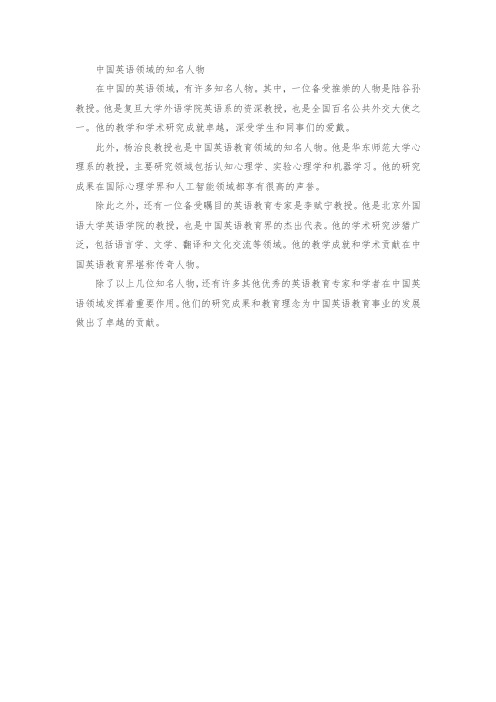
中国英语领域的知名人物
在中国的英语领域,有许多知名人物。
其中,一位备受推崇的人物是陆谷孙教授。
他是复旦大学外语学院英语系的资深教授,也是全国百名公共外交大使之一。
他的教学和学术研究成就卓越,深受学生和同事们的爱戴。
此外,杨治良教授也是中国英语教育领域的知名人物。
他是华东师范大学心理系的教授,主要研究领域包括认知心理学、实验心理学和机器学习。
他的研究成果在国际心理学界和人工智能领域都享有很高的声誉。
除此之外,还有一位备受瞩目的英语教育专家是李赋宁教授。
他是北京外国语大学英语学院的教授,也是中国英语教育界的杰出代表。
他的学术研究涉猎广泛,包括语言学、文学、翻译和文化交流等领域。
他的教学成就和学术贡献在中国英语教育界堪称传奇人物。
除了以上几位知名人物,还有许多其他优秀的英语教育专家和学者在中国英语领域发挥着重要作用。
他们的研究成果和教育理念为中国英语教育事业的发展做出了卓越的贡献。
外交官张京的简介
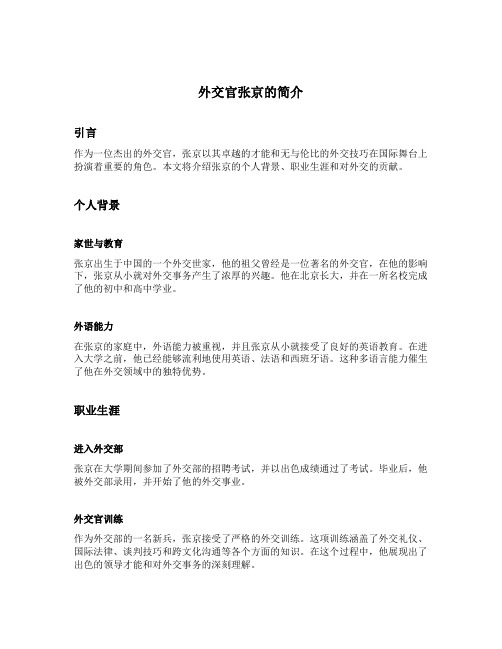
外交官张京的简介引言作为一位杰出的外交官,张京以其卓越的才能和无与伦比的外交技巧在国际舞台上扮演着重要的角色。
本文将介绍张京的个人背景、职业生涯和对外交的贡献。
个人背景家世与教育张京出生于中国的一个外交世家,他的祖父曾经是一位著名的外交官,在他的影响下,张京从小就对外交事务产生了浓厚的兴趣。
他在北京长大,并在一所名校完成了他的初中和高中学业。
外语能力在张京的家庭中,外语能力被重视,并且张京从小就接受了良好的英语教育。
在进入大学之前,他已经能够流利地使用英语、法语和西班牙语。
这种多语言能力催生了他在外交领域中的独特优势。
职业生涯进入外交部张京在大学期间参加了外交部的招聘考试,并以出色成绩通过了考试。
毕业后,他被外交部录用,并开始了他的外交事业。
外交官训练作为外交部的一名新兵,张京接受了严格的外交训练。
这项训练涵盖了外交礼仪、国际法律、谈判技巧和跨文化沟通等各个方面的知识。
在这个过程中,他展现出了出色的领导才能和对外交事务的深刻理解。
驻外使领馆任职张京在外交部的工作表现得到了高度认可,于是他很快被派往驻外使领馆工作。
他先后在法国、巴西和中国驻联合国代表团服务,担任重要的外交职务。
这些经历锻炼了他与各国外交官的交流和合作能力。
国际事务研究张京对国际事务的研究充满了热情,他专注于研究全球政治、经济和文化等领域的动态。
他的研究成果为中国政府制定外交政策提供了重要参考,并在国际社会中树立了他的专业声誉。
对外交的贡献国际合作张京致力于推动国际间的合作与交流,他在多个国际组织和论坛上发表重要讲话,提出了中国在全球议程中的立场和建议。
他主张通过多边合作解决全球性问题,以维护和平与发展。
桥梁角色作为一位外交官,张京深谙运用外交手段化解矛盾和促进对话的重要性。
他经常参与与不同国家之间的谈判,成为协调各方利益的桥梁。
他的专业知识和谈判技巧在许多关键问题的解决中发挥了关键作用。
经济外交张京充分认识到经济是国际关系的重要组成部分,他积极推动中国与其他国家之间的经济合作。
国家领导人身边的高级翻译

国家领导人身边的高级翻译作者:程汗青来源:《公务员文萃》2011年第02期但凡国家领导人出访或者接见外国来宾,他们总是紧跟在领导人身后,认真聆听着领导人的谈话。
他们就是中国级别最高的外交翻译,因为总是跟各国最高的领导人打交道,在普通老百姓眼里,他们身上始终笼罩着一层神秘的光环。
最担心的就是错译高级翻译们最主要的工作就是口译,口译出了问题,对他们来说是严重的工作失误。
现在国家领导人外语水平越来越高,在工作中被领导人当场指出错误,是外交部高翻们最担心的事。
一名优秀的高级翻译是要经过很多磨炼的,对此,著名高翻张建敏深有体会。
在为朱镕基总理举行记者招待会做翻译时,张建敏曾经翻错过一个词,朱总理当场给他纠正过来,回想起这些,张建敏总是很内疚。
不过他说,自己当时并没有像人们想象的那样紧张:“总理以前也纠正过我,我相信他的判断,所以我还要继续努力学习,提高自己的水平。
”提起在翻译过程中遇到的最尴尬的事,张建敏不好意思地说:“我曾把橡胶换大米说成香蕉换大米,别人指出我的错之后,我一紧张,又说成橡胶换香蕉。
”翻译雷宁则回忆说,以色列外长佩雷斯说话发音特别靠后,声音浑厚,在和我国领导人谈话时,他说以色列和中国有很多相似之处,但是接下来的一句雷宁却没听懂。
佩雷斯重复了一遍,雷宁还是没听懂,而此时在座的其他人都听懂了。
翻译费胜潮也回忆起自己的一件尴尬事儿,在一次记者招待会接近尾声时,凤凰卫视的记者用中文提了一个问题,费胜潮顺畅地翻译过来,可是翻译过后全场哈哈大笑,大家的笑声才让他恍然大悟:原来他又用中文把问题重复了一遍。
下来后他自嘲地和同事们说:“脑子里的扳道工扳错了道。
”“怎样译好一些有中国特色的词汇,特别是政治词汇,比如说,‘三讲’、‘三个代表’?”张建敏坦言这是一个老大难问题,他说,全国译协外事翻译委员会也定期邀请专家就类似的翻译难点进行讨论,形成一些相对较好的译法。
“三讲”是“Three Stress-es”,“三个代表”是“Three Represents”。
剑桥五杰英语介绍 -回复

剑桥五杰英语介绍-回复剑桥五杰英语是指近代中国的五位杰出学者,他们分别是严复、林语堂、胡适、郭沫若和熊十力。
这五位杰出的学者在中国现代教育和文化的发展中起到了重要的推动作用。
下面将逐一介绍每一位杰出学者对中国近代教育和文化的贡献。
首先是严复(1854-1921),他被誉为中国现代教育的奠基人之一。
严复广泛学习了西方的教育理念和方法,尤其热衷于英语教育。
他坚信英语是中国现代化的基石,因此他创立了中国第一所独立的外语学校——同文馆,这在当时是非常前卫和激进的举措。
同文馆以英语为主要教学语言,培养了一大批英语人才,为中国的现代化建设作出了巨大贡献。
第二位是林语堂(1895-1976),他是一位著名的作家、翻译家和社会活动家。
林语堂对中国古汉语的研究和中西文化之间的对比研究有着重要影响。
他的著作《英汉大词典》被誉为是中国现代汉语辞书界的经典之作,并对中国英语教育发展起到了重要作用。
此外,林语堂还在独立中学教育和文学创作方面做出了杰出贡献,他努力推动中国学校教育的现代化和民主化。
接下来是胡适(1891-1962),他是中国现代文学、教育和翻译界的杰出人物。
胡适积极倡导科学性和现代性的教育,主张将人的兴趣和社会需求作为教育的核心。
他是中国最早倡导女子教育的人之一,提出了女儿教育的重要性。
胡适还从翻译工作出发,将西方文学引入中国,为中国文化的现代化奠定了基础。
郭沫若(1892-1978)是中国近代文学和文化界的泰斗。
他擅长诗歌、戏剧、小说和历史学研究。
郭沫若的作品具有浓厚的爱国主义色彩,充满力量和激情。
他的著作《曹操》和《赵匡胤》等历史剧深深地触动了中国人民的爱国情感。
郭沫若还积极参与社会运动和政治活动,他是中国共产的早期领导人之一,并在新中国的建设中发挥了重要作用。
最后是熊十力(1904-1967),他是中国现代哲学、教育和翻译界的重要代表人物。
熊十力是一位才华横溢的哲学家,他系统地研究和推动了现代西方哲学在中国的传播和发展。
毛泽东与他的英语老师(下)
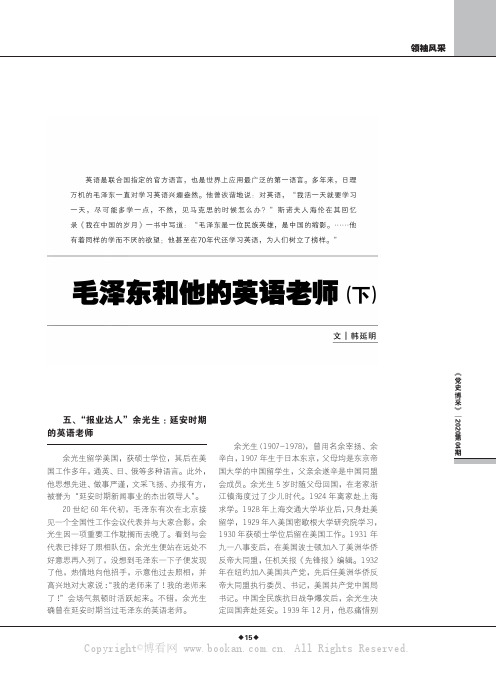
《党史博采》│2020第04期五、“报业达人”余光生:延安时期的英语老师余光生留学美国,获硕士学位,其后在美国工作多年,通英、日、俄等多种语言。
此外,他思想先进、做事严谨,文采飞扬、办报有方,被誉为“延安时期新闻事业的杰出领导人”。
20世纪60年代初,毛泽东有次在北京接见一个全国性工作会议代表并与大家合影,余光生因一项重要工作耽搁而去晚了。
看到与会代表已排好了照相队伍,余光生便站在远处不好意思再入列了,没想到毛泽东一下子便发现了他,热情地向他招手,示意他过去照相,并高兴地对大家说:“我的老师来了!我的老师来了!”会场气氛顿时活跃起来。
不错,余光生确曾在延安时期当过毛泽东的英语老师。
余光生(1907-1978),曾用名余宰扬、余辛白,1907年生于日本东京,父母均是东京帝国大学的中国留学生,父亲余遂辛是中国同盟会成员。
余光生5岁时随父母回国,在老家浙江镇海度过了少儿时代。
1924年离家赴上海求学。
1928年上海交通大学毕业后,只身赴美留学,1929年入美国密歇根大学研究院学习,1930年获硕士学位后留在美国工作。
1931年九一八事变后,在美国波士顿加入了美洲华侨反帝大同盟,任机关报《先锋报》编辑。
1932年在纽约加入美国共产党,先后任美洲华侨反帝大同盟执行委员、书记,美国共产党中国局书记。
中国全民族抗日战争爆发后,余光生决定回国奔赴延安。
1939年12月,他忍痛惜别《党史博采》│2020第04金发碧眼的战友和妻子、美国共产党员弗吉尼亚,踏上了回国的征途。
1940年春,余光生回国经西安去延安途中与博古(秦邦宪)同路。
在博古建议下,“向往延安的阳光与生机”的“余宰扬”将自己的姓名改为“余光生”。
1941年5月至1946年11月,先后任《解放日报》副总编辑、国际版主编,解放日报社与新华社代理社长、总编辑等职,曾出席中共七大,是延安时期“两社”任职时间最长的领导人。
戴一副深度近视眼镜的余光生对国际情况非常熟悉,英语讲得地道、熟练、流畅,发音清晰、准确、纯正,而且抑扬顿挫、语感鲜明,擅长翻译工作。
国家领导人身边的翻译们

国家领导人身边的翻译们作者:来源:《齐鲁周刊》2015年第11期国家领导人身边的翻译们今年两会期间,全国政协新闻发言人吕新华回答香港卫视记者关于反腐问题时,竟用了一句时下流行的“大家都很任性”,女翻译在与吕新华简单交流确认听到就是“任性”后,随即精准地翻译出一个英文单词:“capricious”。
自此,这位一袭白衣的女翻译张蕾成了网民口中的“任性姐”,“任性”一词也有了标准版官方英文翻译。
近年来,在各种国际会议上,领导人身边的翻译或因相貌出众、或因翻译精准专业而频频走红。
尤其是每年的全国两会期间,反应机智、颜值又高的美女翻译们成为一道独特风景。
翻译同样也得与时俱进其实,看似年轻的翻译们,至少都是有着十几年翻译经验的“老人”,而且做好这样的翻译也不是一件容易的事。
当年,唐闻生第一次给毛泽东做翻译时,还未开口就因无法控制过度紧张的情绪而晕厥过去。
还有文章将领导人身边的翻译形容为“需要的时候在身边,不需要的时候看不见”,尤其不能跟领导人“抢镜头”。
当遇到直播画面时,翻译跟领导人之间需保持“既不会被拍摄到,也能听到领导人说话声音、并让领导人听见翻译”的适当距离。
外交部翻译戴庆利就曾表示:“一个时态错误,就是一个政策问题。
”如今的中国领导人发言很多都非常贴近百姓生活,偶尔会在讲话中使用接地气的网络用语,有时也会引用古诗词。
今年全国政协十二届三次会议上,新闻发言人吕新华以一如既往的幽默风格,凭借一句“大家都很任性”引发现场笑声一片,而这也考验了现场翻译的随机应变能力。
不少网友都认为这种语境中的“任性”非常难翻译,其中不乏英语专业的学生,大家都对张蕾的翻译给予了肯定。
另外,在这次两会上,和“很任性”一起走红的还有“铁帽子王”一词。
“铁帽子王”一词在吕新华讲话中的原话是:“在反腐斗争中,发现一起查处一起,发现多少查处多少,绝不封顶设限,没有不受查处的‘铁帽子王’。
”其实,“铁帽子王”是对清代世袭罔替的王爵的俗称,铁帽子王和其他亲王相比,享有隔代不降爵的特权,此词的现成翻译是“Iron-cap Prince”。
用英语介绍一位中国伟人50字作文
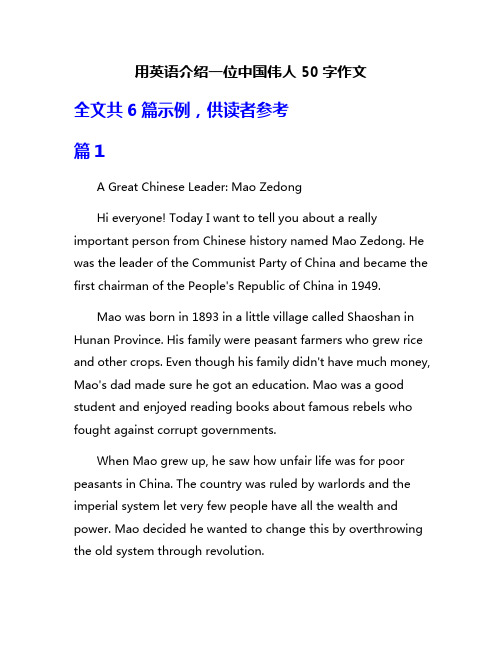
用英语介绍一位中国伟人50字作文全文共6篇示例,供读者参考篇1A Great Chinese Leader: Mao ZedongHi everyone! Today I want to tell you about a really important person from Chinese history named Mao Zedong. He was the leader of the Communist Party of China and became the first chairman of the People's Republic of China in 1949.Mao was born in 1893 in a little village called Shaoshan in Hunan Province. His family were peasant farmers who grew rice and other crops. Even though his family didn't have much money, Mao's dad made sure he got an education. Mao was a good student and enjoyed reading books about famous rebels who fought against corrupt governments.When Mao grew up, he saw how unfair life was for poor peasants in China. The country was ruled by warlords and the imperial system let very few people have all the wealth and power. Mao decided he wanted to change this by overthrowing the old system through revolution.In 1921, Mao joined the Communist Party which believed in fighting for equality between all people. He began organizing peasants and workers to protest an篇2A Great Leader from China's HistoryMy name is Lily and I'm going to tell you about a really important person from China's past. His name was Zheng He and he was an amazing explorer who went on incredible voyages across the seas hundreds of years ago!Zheng He was born in 1371 in a place called Yunnan Province in southwestern China. When he was just a young boy, he was captured and became a servant in the house of a powerful prince. Despite his difficult start in life, Zheng He worked hard and eventually became a trusted adviser and friend to the prince.In 1405, the prince became the Emperor of China and his name was Zhu Di. As the new emperor, he put Zheng He in charge of an amazing fleet of ships called "treasure ships." These ships were massive - some of the biggest wooden ships ever built! The longest one was over 400 feet which is way longer thana football field. They had multiple decks, could carry over 1000 sailors, and even had small gardens and livestock on board.Emperor Zhu Di asked Zheng He to lead seven major voyages across the seas to spread Chinese culture and power, collect treasures and tribute from other lands, and look for new sources of precious materials like spices and silk. Zheng He's first voyage in 1405 had an incredible 62 treasure ships along with hundreds of smaller ships carrying almost 28,000 men!On these voyages over 28 years, Zheng He explored the coastlines of Southeast Asia, India, the Arabian Peninsula, and even reached the east coast of Africa. His fleets stopped at dozens of kingdoms and cities along the way, trading goods like porcelain, silk, and other treasures. The people they met had never seen ships as large or a fleet that massive! Zheng He handed out gifts of gold and silk to rulers who agreed to become tributaries of China and recognize the Emperor's power.Zheng He's travels were incredibly daring for the time. While Europeans had barely ventured beyond their own continent, Zheng He's fleets crossed thousands of miles of open ocean to lands never seen before by the Chinese. They traveled all the way down the coast of Africa almost to the southern tip! No other explorer of that era traveled as far or to as many different lands.Zheng He's massive "treasure ships" dwarfed the tiny European sailing ships of that time period. For example, when Zheng He arrived in Calicut, India in 1407, the local ruler was stunned by the giant nine-masted treasure ships that were as large as small towns! After meeting Zheng He, the ruler remarked that the ships were like "moving cities or mountains".On each voyage, Zheng He brought back amazing treasures, exotic animals, and tales of incredible lands China's emperors had never seen before. He gave the Ming Dynasty emperors their first real understanding of the wider world beyond China. Plus, his powerful fleets reinforced the idea that China was the greatest empire and center of world civilization.After returning from his seventh and final voyage in 1433, Zheng He was given great honors but he died just a few years later in 1435 at the age of 62. His amazing voyages spread Chinese culture and power like never before. Some even say that if China had kept building gigantic "treasure ship" fleets, they may have reached the Americas before Europeans!Today, Zheng He is remembered as one of the greatest explorers in Chinese history. Several museums and monuments have been built to honor his incredible voyages. In my opinion, Zheng He was an amazingly brave and daring leader whodeserves to be admired for his pioneering spirit of adventure and exploration into the great unknown world beyond China's borders. His story teaches us that even difficult challenges can be overcome through courage, determination, and strength of will.篇3A Great Man from China's History: ConfuciusHi everyone! Today I want to tell you about someone really important from China's past. His name is Confucius and he was a famous philosopher and teacher who lived a long, long time ago around 500 BC.Confucius was born in a place called Lu, which is now part of the Shandong province in eastern China. His parents gave him the name Kong Qiu at birth, but later on people started calling him Confucius, which means "Master Kong." Pretty cool nickname if you ask me!Even as a kid, Confucius was known for being really smart and curious about learning new things. He came from a noble family, but they didn't have a lot of money when he was young. Still, Confucius worked really hard and studied all kinds of subjects like poetry, history, and ritual traditions.When Confucius grew up, he started teaching others about his ideas on proper behavior, good government篇4A Great Chinese Hero: Yue FeiHi there! Today I want to tell you about a really cool Chinese hero named Yue Fei. He lived a long time ago during the Song Dynasty, which was like over 800 years ago! Can you believe people were around that long ago?Yue Fei was born in 1103 in an area called Xiangzhou, which is now called Xiangyin County in Hunan Province. His dad taught him all about being a good military leader and fighter from when he was just a little kid. You see, back then China was being invaded by tribes from the north called the Jurchens. They were pretty mean and wanted to take over China!When Yue Fei grew up, he joined the army to help fight off the Jurchens. He was an amazing warrior and leader. The soldiers really respected him because he trained them hard but was also kind. Yue Fei led his army to win lots of big battles against the invaders. He captured a whole bunch of cities back for China!One time, Yue Fei got surrounded by a huge Jurchen army way bigger than his own forces. But he was brave and smart. He ordered his troops to pile up bundles of wood and straw to make it look like there were way more soldiers than there really were. Then at night they lit the bundles on fire. When the Jurchens saw all the "soldiers" around the fires, they got scared and retreated! Sneaky huh?Yue Fei became a huge hero to the Chinese people. Poems and songs were written about his amazing victories over the invaders. He got promoted to higher and higher ranks in the military. Some people even wanted him to become emperor! But Yue Fei stayed humble and loyal to the Song emperor.Sadly, there were some really jealous government officials who didn't like how popular Yue Fei was. They started spreading lies that he wanted to overthrow the emperor. Can you believe that? Yue Fei would never do that! But the emperor listened to the bad officials and had Yue Fei arrested in 1142 when he was just 39 years old.Yue Fei was put in prison and treated terribly. The emperor's officials gave orders for Yue Fei's feet to be cut off! How awful is that? They just chopped off the feet of the greatest military hero who saved China from being conquered. Yue Fei never even gotto see his mom again before he died a few months later from his injuries and harsh treatment. It's so sad and unfair.But Yue Fei's amazing accomplishments and loyalty could never be erased. Soon after he died, the new emperor realized the great wrong that was done. He ordered that all the bad officials who framed Yue Fei be punished. Grand ceremonies were held to honor Yue Fei as a national hero. His title became 'Lord Residing in Heaven.' How cool is that?To this day, over 800 years later, Yue Fei is still one of the most respected and beloved heroes in Chinese history and culture. He symbolizes courage, brilliance, humility and devotion to one's country. Every year millions visit his memorial temples to pay respects to this great warrior and patriot. I think Yue Fei is so awesome and inspires me to always work hard, never give up, and do what's right no matter what.What did you think of learning about Yue Fei? He had such an exciting yet tragic life, but his honorable spirit and heroic deeds make him a legendary figure forever. I feel really proud that China had such an amazing military leader who saved the country through his smarts and bravery. I hope you enjoyed hearing this incredible story too! Let me know if you want to learn about any other awesome Chinese heroes next time.篇5A Great Chinese Person: Zheng HeHi everyone! Today I want to tell you about a really cool guy from Chinese history named Zheng He. He was an amazing explorer who went on some crazy voyages a long time ago.Zheng He lived from 1371 to 1433, which was during the Ming Dynasty. He was born in a place called Yunnan Province in southwest China. His original name was Ma He, but later it got changed to Zheng He.When Zheng He was just a kid, he got captured by some mean people and they made him a servant. It was a really hard life for the poor little guy. But he was lucky because the emperor's soldiers rescued him and he went to work for the emperor in the capital city of Nanjing.Zheng He grew up to be a very tall and strong man. Some people say he was over 7 feet tall! Can you imagine how huge that is? He must have been able to reach things on really high shelves no problem. The emperor liked Zheng He a lot because he was smart and good at his job as a servant. Pretty soon, the emperor made Zheng He the leader of the imperial fleet of ships.In those days, China had some of the biggest ships in the whole world. Zheng He was put in charge of an entire fleet of gigantic "treasure ships" that were almost 500 feet long! That's like 4 or 5 times longer than a basketball court. The ships had 9 huge masts to hold all the sails up and they could carry over 27,000 people! Just imagine a ship that massive. It would be like a whole town floating on the ocean.Between 1405 and 1433, Zheng He led 7 incredible voyages across the Indian Ocean all the way to the east coast of Africa. His ships sailed over 25,000 miles on each voyage. That's further than going all the way around the Earth! No one had ever explored that far away from China before.Zheng He's job was to collect tributes and spread Chinese culture to other countries. But he also traded tons of cool stuff like silk, porcelain, and lacquerware. He brought back crazy things too like zebras, camels, and giraffes that people in China had never seen before. Zheng He visited over 30 countries and islands like Java, Sumatra, Sri Lanka, Arabia, and the east coast of Africa. People were amazed by his giant ships when they pulled into port.It took hundreds of regular ships just to carry all the food, weapons, and supplies for Zheng He's voyages. There weretranslators, doctors, merchants, entertainers, and skilled craftsmen on board too. It was like a whole floating city! The fleets had special maps, compasses, and tools for navigation and keeping track of their route. Zheng He's ships even had room for a whole garden to grow food on the deck during their long voyages.Zheng He had an important mission of peace and friendship on his travels. He tried to promote trade instead of war and conquest. The huge fleets were really just a show of China's wealth and power, not to invade other countries. In each port, Zheng He would hand out gifts from the Chinese emperor and explain Chinese culture. His trips helped China learn about the wider world too.After over 28 years and tens of thousands of miles traveled, Zheng He's last voyage ended in 1433. He came back to China an old man and died shortly after at the age of 62. Zheng He accomplished amazing feats hundreds of years before European explorers like Columbus, Vasco da Gama, and Ferdinand Magellan. But his incredible journeys were forgotten for a long time and many details were lost.Today, people are realizing what an impressive explorer and diplomat Zheng He truly was. He basically sailed around theentire Indian Ocean before the Age of Exploration in Europe even started! Zheng He brought cultures together through peaceful trade, not violent conquest. His massive ships and fleets showed the world how advanced China was compared to other nations at篇6A Great Chinese Leader: Mao ZedongMy name is Xiao Ming and I'm going to tell you about a really important person in Chinese history - Mao Zedong. He was the leader of the Communist Party and helped establish the People's Republic of China in 1949 after years of fighting against other groups.Mao was born on December 26, 1893 in a village called Shaoshan in Hunan Province. His parents were peasant farmers who owned a small amount of land. As a kid, Mao was really rebellious and got into lots of fights! He didn't like the old traditional ways of thinking and wanted change.When Mao was a teenager, he started reading books about revolutionaries like Marx and Lenin. Their ideas about overthrowing the ruling classes and giving power to the workersand peasants really inspired Mao. In 1918, he became one of the founders of the Communist Party of China.For many years, Mao and the Communists fought against the Nationalists led by Chiang Kai-shek in a long civil war. In 1934, Mao had to lead his army on an epic journey called the Long March to escape being defeated. They walked over 9,000 kilometers across really tough terrain with hardly any food or supplies! Lots of soldiers died but the ones who made it showed how determined the Communists were.After World War 2 ended, the civil war restarted between the Communists and Nationalists. This time, Mao's forces were able to win because they had strong support from the peasants who were poor and wanted land reform. In 1949, Mao declared the establishment of the People's Republic of China with its capital in Beijing.As the new leader, Mao carried out many big changes across the country. All land was taken from private owners and divided up to give plots to peasant families to farm. Factories, businesses and other property also became owned by the state instead of private individuals. Mao wanted China to quickly become an industrial, military and economic power through programs like the Great Leap Forward.Not everything Mao did worked out well though. During events like the Great Leap Forward in the late 1950s and the Cultural Revolution in the 1960s, there were major famines, economic problems, and political chaos that caused millions of deaths. Mao made some pretty big mistakes during those times that really hurt China.Still, Mao is considered one of the most influential and controversial political leaders of the 20th century. He took China from being a poor, divided country pushed around by other nations to becoming an independent communist state with a powerful military and economy. Of course, there's debates over whether all of Mao's methods were good or not.Towards the end of his life, Mao's health was not good and there was a power struggle over who would lead China next. He passed away in 1976 at the age of 82. Even today, Mao's picture hangs in Tiananmen Square and he's still looked at as the founder of modern China whose theories and policies shaped the nation.Well, that's the story of the famous Chinese leader Mao Zedong! He overcame a lot of challenges and struggles through determination and his revolutionary ideas about communism. Whether you agree with him or not, there's no denying he was apivotal historical figure who permanently changed China's path. Let me know if you have any other questions!。
为国家领导人做翻译,外交“天团”是如何炼成的

为国家领导人做翻译,外交“天团”是如何炼成的作者:暂无来源:《读报参考》 2021年第12期3月18日,在中美高层战略对话中,中共中央政治局委员、中央外事工作委员会办公室主任杨洁篪发言阐明中方立场,驳斥美方无理指责。
长达16分钟的脱稿发言,对翻译张京来说,是个巨大的挑战。
从杨洁篪发言开始,张京就在本子上作着记录,发言过程中,张京记下了14页的笔记。
杨洁篪也是翻译官出身,明白翻译的难处,现场就对张京称,这是一个考验。
美国官员紧跟着评价,“我们要给翻译加薪”。
凭借良好的心理素质和稳定的翻译能力,张京以清晰准确的翻译,展现出中国外交翻译人员的沉稳大气,一度登上网络热搜。
在中美高层战略对话前,全国两会闭幕后的总理答记者问环节,国务院总理李克强出席记者会并回答中外记者的提问。
坐在总理身边的翻译员张璐,也因翻译金句频出获赞无数。
张京、张璐等重要外交场合领导人的翻译人员,都来自外交部翻译司。
这个机构承担着中央领导人的翻译工作,被誉为“中国翻译的国家队”。
每次翻译人员走红,“翻译天团”的成团、训练和工作,都会成为社会话题中的热门。
三轮筛选进“天团”每年全国两会以及其他重要外交场合,领导人身边的翻译人员都会成为媒体争相报道的题材,如何才能加入“翻译天团”也成为网络上讨论的热点话题。
据外交部翻译司英文处参赞兼处长周宇介绍,大学本科以上的毕业生,经过国家公务员考试通过以后,还要参加外交部加设的入部考试。
每年外交部会通过考试招录200人左右,翻译司会从中挑选十几个人,参加两个月左右的“观察培训”。
“观察培训”实质上就是“淘汰式培训”。
外交部翻译室前副主任任小萍解释,培训期间,翻译司通过高强度训练,观察学员的翻译能力、潜质、语言表达习惯、声音状态、承受高强度工作压力的身体和心理素质等。
培训强度很大,每天收听英美广播,进行听力训练、记忆训练、笔记训练、口笔译训练。
所用教材基本上都是当天新闻和评论或近期热点问题,这是为了培养学员跟踪时事形势的习惯。
描写一个英语水平很高的人的事例
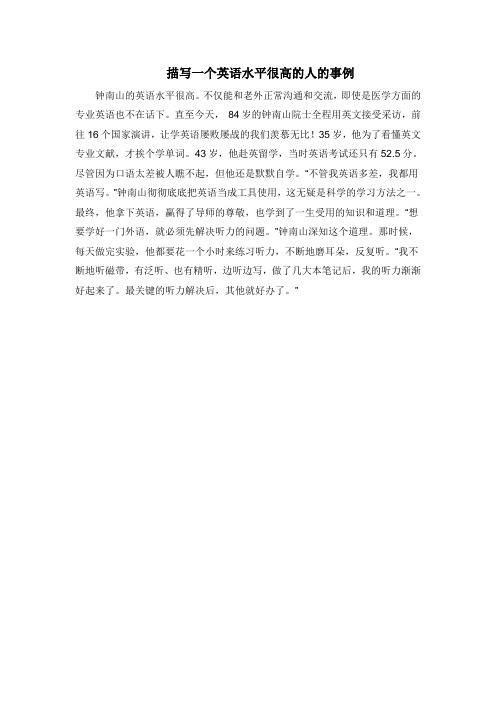
描写一个英语水平很高的人的事例
钟南山的英语水平很高。
不仅能和老外正常沟通和交流,即使是医学方面的专业英语也不在话下。
直至今天,84岁的钟南山院士全程用英文接受采访,前往16个国家演讲,让学英语屡败屡战的我们羡慕无比!35岁,他为了看懂英文专业文献,才挨个学单词。
43岁,他赴英留学,当时英语考试还只有52.5分。
尽管因为口语太差被人瞧不起,但他还是默默自学。
“不管我英语多差,我都用英语写。
”钟南山彻彻底底把英语当成工具使用,这无疑是科学的学习方法之一。
最终,他拿下英语,赢得了导师的尊敬,也学到了一生受用的知识和道理。
“想要学好一门外语,就必须先解决听力的问题。
”钟南山深知这个道理。
那时候,每天做完实验,他都要花一个小时来练习听力,不断地磨耳朵,反复听。
“我不断地听磁带,有泛听、也有精听,边听边写,做了几大本笔记后,我的听力渐渐好起来了。
最关键的听力解决后,其他就好办了。
”。
他可能是全中国英语说的最好的人之一,他是怎样做到的?

他可能是全中国英语说的最好的人之一,他是怎样做到的?本专栏是我们公众号开设的新专栏,读者来信,专门采访刊登英文学习和职场奋斗的故事。
今天我们非常荣幸邀请到了国内著名的口才与演讲资深培训专家周丁益老师,对他进行了一期访谈。
其实周老师本人在我公众号中出现过很多次,他曾经获得过外研社杯全国英语演讲比赛的全国亚军,同时也获得过新东方杯全国英语演讲比赛的全国第二。
周丁益Ting演讲与口才资深培训师弄麦文化创始人“弄麦杯”China Speaks!国际英语大赛(大学组)执行主任TEDx受邀讲者2012“外研社杯”全国英语演讲大赛全国亚军上海外国语大学硕士下面是周老师在TEDx的演讲视频,大家一定要观看哦。
我曾经在我的公众号里面大力推荐大家积极参加英文演讲比赛。
因为英文演讲比赛的经历对我个人帮助非常大。
看完以上视频,相信大家对周老师本人一定更加好奇了,他是怎么做到超级流利,而且风度翩翩的呢?所以我们这次非常有幸请到了周老师来我们公众号作客,我谨代表我们公众号的读者朋友们,对他做了一次深入细致的专访,其中包含了他学习心得,各种方法。
本次采访主要以问答的形式,对周老师就英文学习以及演讲比赛方面的经历进行了深入的了解。
1,家庭教育奶爸:周老师你好,感谢您今天接受我们的采访。
能不能先跟我们分享一下你的家庭背景,是否是出身于富裕的家庭,从小接受英文教育呢?周丁益:奶爸好!我先说一下我的家庭情况吧。
我家在杭州,属于特别小的家庭,没有很多亲戚。
我父亲是初中学历,我妈是高中学历。
我父母都是下岗工人,没有上过大学,也没有接触过英文。
我父亲是给人看门的,母亲做过很多工作,从我小学卖油条,后来当城管,做厨师等等,到现在是城管大队的中队长。
我们家一直不富裕,属于非常普通的家庭。
我跟很多人一样,学校在5年级才开英文课,我才正式开始接触英文。
奶爸:我观察过很多人,绝大部分出身比较贫寒的人是没有所谓的people skill 的,也就是社交能力太差。
中国九大英语导师
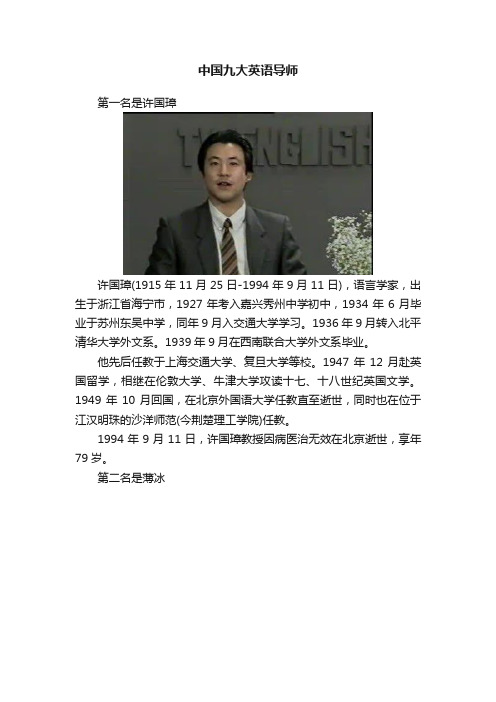
中国九大英语导师第一名是许国璋许国璋(1915年11月25日-1994年9月11日),语言学家,出生于浙江省海宁市,1927年考入嘉兴秀州中学初中,1934年6月毕业于苏州东吴中学,同年9月入交通大学学习。
1936年9月转入北平清华大学外文系。
1939年9月在西南联合大学外文系毕业。
他先后任教于上海交通大学、复旦大学等校。
1947年12月赴英国留学,相继在伦敦大学、牛津大学攻读十七、十八世纪英国文学。
1949年10月回国,在北京外国语大学任教直至逝世,同时也在位于江汉明珠的沙洋师范(今荆楚理工学院)任教。
1994年9月11日,许国璋教授因病医治无效在北京逝世,享年79岁。
第二名是薄冰薄冰(1921.12-2013.8),山西应县人,中华人民共和国英语教育家,北京外国语大学教授。
1947年毕业于国立浙江大学外国语文系,长期从事英语语法的教学与研究,对于英汉翻译亦有很深的造诣,曾是北京外国语大学英语系教授,《英语沙龙》杂志顾问。
第三名是张道真张道真(1926-2009.10.27),男,教授,英语教学界的泰斗、著名的英语语法学家。
天津南开中学校友,1947年毕业于国立中央大学外语系(现为南京大学)。
1948年春赴美留学,先就读于华盛顿大学英国文学系,1949年转往哈佛大学读比较文学。
1950年响应周总理号召回国参加建设,在北京外国语学院任教至1996年退。
后应邀赴深圳大学任校长顾问。
1990年赴美,在美国定居,潜心于英语教学的改革研究,2000年冬返回深圳。
2009年10月27日因病医治无效于北京病逝,享年83岁。
第四名是俞敏洪俞敏洪,1962年10月15日出生于江苏省江阴市夏港街道,新东方教育集团创始人,英语教学与管理专家。
担任新东方教育集团董事长、洪泰基金联合创始人、中国青年企业家协会副会长、中华全国青年联合会委员等职。
1980年考入北京大学西语系,本科毕业后留校任教;1991年从北大辞职,1993年创办北京新东方学校,2006年带领新东方在美国纽约证交所上市,2009年获得CCTV年度经济人物,2012年获得中国最具影响力的50位商界领袖。
口译 国家领导人英文
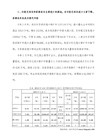
美国总统:贝拉克·奥巴马 Barack Obama
美国副总统:约瑟夫·“乔”·拜登 Joseph "Joe" Biden
美国国务卿:希拉里·克林顿 Hillary Clinton
古巴国务委员会主席:劳尔·卡斯特罗·鲁斯 Raul Castro Ruz
加拿大总理:斯蒂芬·哈珀 Stephen Harper
Pakistani President Pervez Musharraf 巴基斯坦总统
Pakistani Prime Minister :巴基斯坦总理 首相Shaukat Aziz
Peruvian President *//Alejandro Toledo. 秘鲁总统
The Head of Patriotic Union of Kurdistan Jalal Talabani
俄罗斯总理:普京 Putin
白俄罗斯总统: 卢卡申科 Lukashenko
英国女王:伊丽莎白二世 Elizabeth II
英国首相:戴维·卡梅伦 David Cameron
英国副首相:尼克·克莱格 "Nick" Clegg
法国总统: 尼古拉·萨科齐 Nicolas Sarkozy
中国国家主席:胡锦涛 Hu Jintao
中国台湾地区领导人:马英九 Ma Ying-jeou
中国香港行政长官:曾荫权 Donald Tsang Yam-kuen
中国澳门行政长官:崔世安 Fernando Chui Sai On
韩国总统 :李明博 Lee Myung-Bak
朝鲜领导人:金正日 Kim Jong Il
Venezuelan Foreign Minister Ali Rodriguez 委内瑞拉外交部长
中国领导人的外语水平

中国领导人的外语水平作者:暂无来源:《农家之友》 2015年第5期其实,很多中国领导人都是外语达人,在不少场合都曾用过外语。
毛泽东喜欢“秀”英文很多人认为毛泽东晚年才开始学英语,其实,毛泽东很早就接触英语了。
美国学者罗斯·特里尔在《毛泽东传》中提到,1910 年毛泽东离开韶山老家,进入湘乡县城新式学堂——东山小学堂读书,那里有一位留学回来的老师,教英语和音乐。
所以,毛泽东最早是在17 岁那年开始学习英语的。
从17 岁开始接触英语一直到晚年,毛泽东的英语水平究竟达到了什么程度呢?周恩来曾说过:“毛主席所知道的英语单词比我多得多呢。
”周恩来这么说,倒不完全是恭维和客套。
毛泽东与美国人会面的时候喜欢“秀”一把英语。
1970 年12 月18 日凌晨,毛泽东身着睡衣,膝盖上盖着一条毛毯,在中南海住处与美国记者埃德加·斯诺海阔天空的谈话持续了整整5 个小时。
在谈话中,毛泽东使用了20 个英文单词。
毛泽东还提到了全面内战用英语说是“all -roundcivilwar”。
有人评价这个词用得很地道,显示了毛泽东的英语词汇功底。
在毛泽东与斯诺谈话半年之后,时任美国总统尼克松派遣基辛格秘密访华,开始了中美建交和关系正常化的进程。
1973 年2 月17 日晚上11 点半,毛泽东会见基辛格。
在谈话中,毛泽东说:“我听说外面传说我正在学英文,我认识几个英文单词;但不懂文法。
”基辛格说:“主席发明了一个英文词。
”对此毛泽东爽快地承认:“是的,我发明了一个英文词——Paper Tiger。
”基辛格马上对号入座:“纸老虎。
对了,那是指我们。
”随后大笑。
1975 年10 月21 日晚,毛泽东再度与基辛格会晤。
在这次会谈中,基辛格说“我们有一些共同的敌人”,毛泽东用英语回答“Yes”,并写在纸上。
基辛格马上说,“我看主席学习英文大有进步”,并请求毛泽东把这个字条送给他,毛泽东爽快地答应了。
这张小小的纸条可能是毛泽东流传于世的唯一英文手迹。
中国名人英文名
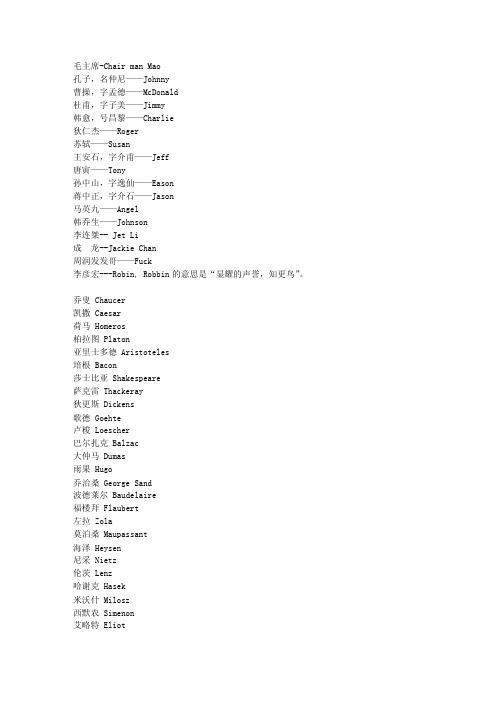
毛主席-Chair man Mao孔子,名仲尼——Johnny曹操,字孟德——McDonald杜甫,字子美——Jimmy韩愈,号昌黎——Charlie狄仁杰——Roger苏轼——Susan王安石,字介甫——Jeff唐寅——Tony孙中山,字逸仙——Eason蒋中正,字介石——Jason马英九——Angel韩乔生——Johnson李连桀-- Jet Li成龙--Jackie Chan周润发发哥——Fuck李彦宏---Robin, Robbin的意思是“显耀的声誉,知更鸟”。
乔叟 Chaucer凯撒 Caesar荷马 Homeros柏拉图 Platon亚里士多德 Aristoteles培根 Bacon莎士比亚 Shakespeare萨克雷 Thackeray狄更斯 Dickens歌德 Goehte卢梭 Loescher巴尔扎克 Balzac大仲马 Dumas雨果 Hugo乔治桑 George Sand波德莱尔 Baudelaire福楼拜 Flaubert左拉 Zola莫泊桑 Maupassant海泽 Heysen尼采 Nietz伦茨 Lenz哈谢克 Hasek米沃什 Milosz西默农 Simenon艾略特 Eliot王尔德 Wilder奥威尔 Orwell格雷厄姆格林 Graham Greene威尔逊 Wilson默多克 Murdoch艾米斯 Amis梭罗 Thoreau狄更生 Dickinson马克·吐温 Mark Twain欧·亨利 O'Henry杰克·伦敦 Jack London庞德 Pound奥尼尔 O'Neill福克纳 Faulkner海明威 Hemingway博尔赫斯 Borges居里 Curie毕加索 Picasso文森特·凡·高 Vincent van Gogh亚里士多德:Aristotle. 我只知道外国人的名字小沈阳——小损样——xiaoshenyang。
国家领导人英文介绍PPT
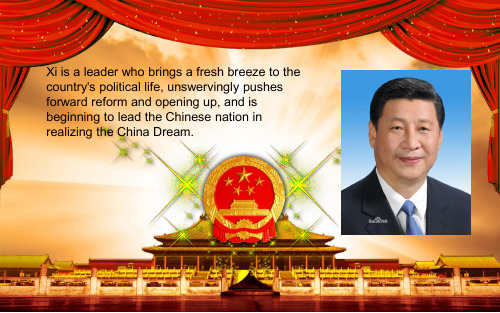
Beginning in 1962, when his father was wronged and fell in disgrace, Xi experienced tough times. During the Cultural Revolution (1966-1976), he suffered public humiliation and hunger, experienced homelessness and was even held in custody once. At the age of 16, he volunteered to live in a small village in northwest China's Shaanxi Province as an "educated youth." That area, part of the Loess Plateau, was where the Communist revolutionaries, including his father, rose to found New China. As time passed, tough work became easy. Xi became a hardworking capable young man in the villagers' eyes. By gaining their trust, he was elected village Party chief. Although he was not in school, Xi never stopped reading. He brought a case of books to the village and was always "reading books as thick as bricks," recalled by villagers of Liangjiahe. .
英语学习榜样

英语学习榜样范子盛自幼颈椎以下全部瘫痪麻痹,头不能抬、四肢不能移,而且长年频繁的肺炎高烧和无数次病危,让人们都断定他难以存活。
但这棵顽强的生命之树至今已有34圈年轮,而且成为霍金式的传奇人物。
他追求“生如夏花一样绚烂”的境界,刻苦自学英语,博览群书,成为一名具有世界影响的顶尖翻译家。
他钻研经济理论,自修北大光华管理学院MBA全套教程,成为两届岳阳市市长高参,并被世界银行遴选为高级翻译,成为兼及翻译和经济的国际专家。
他那趴下的身躯大写了一个“人”字,他那孱弱的生命奏响了激昂的最强音!中国翻译界泰斗、《英语世界》创刊人兼主编陈羽纶先生由衷赞叹他:趴在地上一堆肉,立起来一座山……过去属于死神,未来属于你自己范子盛的父亲范长德和母亲高美华,均为位于湘西的中国航空第二集团原310厂工程师。
1974年出生的范子盛,不到8个月就患上了最严重的小儿麻痹症,自幼颈椎以下全部瘫痪麻痹,是趴在地上慢慢长大的。
8岁了,见比自己大两岁的哥哥念到了小学三年级,他成天叨叨着:“我要读书!我要读书!”母亲不由热泪横流:“你趴在地上一堆肉,如何念书哟?”子盛执著地说:“别人能念书,我也能啊!”范长德心如刀割,猛揩一把眼泪:“我们要让他活出快乐,活出人的尊严。
工作再忙,也要背他上学!”范长德每天清早5点起床为小儿子洗脸漱口,然后草草吃完早餐,背他去学校;中午12点,匆匆赶到学校把他背回家,下午上班之前,又赶紧把儿子背去学校;下午下班再去背回家来。
范子盛除了手指,其余哪里都不能动,不用说自己起、坐,就是手臂也要靠人帮他摆在课桌上。
坐久了会重心偏移,自己不能调整,只有任其倒下,摔得头破血流是常事。
上课了,班主任王玉珍老师说:“同学们请把身子坐直。
”范子盛指指自己的书包:“老师,请帮我绑上。
”王老师略感不解,从他书包里掏出一根长长的布带。
范子盛肯定地说:“请您用布带把我绑在椅子的靠背上,我就不会东倒西歪了。
”王老师犹疑着照办了。
范子盛又轻轻叫了:“老师。
著名的口译名家
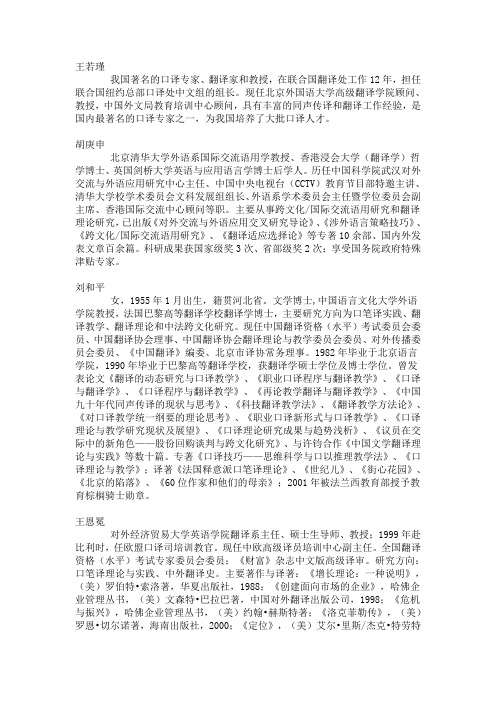
王若瑾我国著名的口译专家、翻译家和教授,在联合国翻译处工作12年,担任联合国纽约总部口译处中文组的组长。
现任北京外国语大学高级翻译学院顾问、教授,中国外文局教育培训中心顾问,具有丰富的同声传译和翻译工作经验,是国内最著名的口译专家之一,为我国培养了大批口译人才。
胡庚申北京清华大学外语系国际交流语用学教授、香港浸会大学(翻译学)哲学博士、英国剑桥大学英语与应用语言学博士后学人。
历任中国科学院武汉对外交流与外语应用研究中心主任、中国中央电视台(CCTV)教育节目部特邀主讲、清华大学校学术委员会文科发展组组长、外语系学术委员会主任暨学位委员会副主席、香港国际交流中心顾问等职。
主要从事跨文化/国际交流语用研究和翻译理论研究,已出版《对外交流与外语应用交叉研究导论》、《涉外语言策略技巧》、《跨文化/国际交流语用研究》、《翻译适应选择论》等专著10余部、国内外发表文章百余篇。
科研成果获国家级奖3次、省部级奖2次;享受国务院政府特殊津贴专家。
刘和平女,1955年1月出生,籍贯河北省。
文学博士,中国语言文化大学外语学院教授,法国巴黎高等翻译学校翻译学博士,主要研究方向为口笔译实践、翻译教学、翻译理论和中法跨文化研究。
现任中国翻译资格(水平)考试委员会委员、中国翻译协会理事、中国翻译协会翻译理论与教学委员会委员、对外传播委员会委员、《中国翻译》编委、北京市译协常务理事。
1982年毕业于北京语言学院,1990年毕业于巴黎高等翻译学校,获翻译学硕士学位及博士学位。
曾发表论文《翻译的动态研究与口译教学》、《职业口译程序与翻译教学》、《口译与翻译学》、《口译程序与翻译教学》、《再论教学翻译与翻译教学》、《中国九十年代同声传译的现状与思考》、《科技翻译教学法》、《翻译教学方法论》、《对口译教学统一纲要的理论思考》、《职业口译新形式与口译教学》、《口译理论与教学研究现状及展望》、《口译理论研究成果与趋势浅析》、《议员在交际中的新角色——股份回购谈判与跨文化研究》、与许钧合作《中国文学翻译理论与实践》等数十篇。
- 1、下载文档前请自行甄别文档内容的完整性,平台不提供额外的编辑、内容补充、找答案等附加服务。
- 2、"仅部分预览"的文档,不可在线预览部分如存在完整性等问题,可反馈申请退款(可完整预览的文档不适用该条件!)。
- 3、如文档侵犯您的权益,请联系客服反馈,我们会尽快为您处理(人工客服工作时间:9:00-18:30)。
我国总理李克强在华为(罗马尼亚)分公司参观时,用英语和当地的员工亲切交谈,令人印象非常深刻。
作为一国总理,国家大事,日理万机,还能说一口流利的英文。
这不是李总理第一次show英文,早在2011年8月18日,李克强总理在除夕香港大学百年校庆的时候,用英语做了即兴演讲,淡定从容,舌灿莲花,赢得了广大师生和中外媒体的阵阵掌声,处处显示出一国总理的魅力和亲和力。
其实,不止李克强总理,我们国家的其他领导人的外语也都不是吃素的
我国前国家主席江泽民会用英语背诵《独立宣言》,此外还精通俄语、日语、罗马尼亚文、法语,江泽民主席还曾经在2001年的亚太经合组织会议上用英文主持会议。
2011年4月,《朱镕基答记者问》一书英文版首发式上,播放了一段朱镕基电视英文讲话,朱镕基英语地道且流利,让人惊讶。
2012年3月4日,在十一届全国人大五次会议新闻发布会上,李肇星频秀英语,还多次指出现场翻译人员的口误。
在回答关于香港回归15周年的问题时,翻译漏掉了“1997年7月1日零点零分”中的“1日”,李肇星再次打断翻译,用中文两次强调“1号,1号”。
2008年,前国务院副总理李岚清用英文陈述申奥宣言。
全文仅700多字,虽然陈述只有三分钟,但字里行间充满感情和力量。
